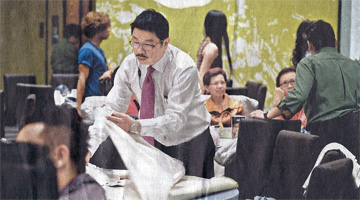|
| |
|
| |
|
|







|
|
TCHS 4O 2000 [4o's nonsense] alvinny [2] - csq - edchong jenming - joseph - law meepok - mingqi - pea pengkian [2] - qwergopot - woof xinghao - zhengyu HCJC 01S60 [understated sixzero] andy - edwin - jack jiaqi - peter - rex serena SAF 21SA khenghui - jiaming - jinrui [2] ritchie - vicknesh - zhenhao Others Lwei [2] - shaowei - website links - Alien Loves Predator BloggerSG Cute Overload! Cyanide and Happiness Daily Bunny Hamleto Hattrick Magic: The Gathering The Onion The Order of the Stick Perry Bible Fellowship PvP Online Soccernet Sluggy Freelance The Students' Sketchpad Talk Rock Talking Cock.com Tom the Dancing Bug Wikipedia Wulffmorgenthaler |
|
bert's blog v1.21 Powered by glolg Programmed with Perl 5.6.1 on Apache/1.3.27 (Red Hat Linux) best viewed at 1024 x 768 resolution on Internet Explorer 6.0+ or Mozilla Firefox 1.5+ entry views: 1663 today's page views: 118 (10 mobile) all-time page views: 3242716 most viewed entry: 18739 views most commented entry: 14 comments number of entries: 1214 page created Wed Apr 9, 2025 08:38:30 |
|
- tagcloud - academics [70] art [8] changelog [49] current events [36] cute stuff [12] gaming [11] music [8] outings [16] philosophy [10] poetry [4] programming [15] rants [5] reviews [8] sport [37] travel [19] work [3] miscellaneous [75] |
|
- category tags - academics art changelog current events cute stuff gaming miscellaneous music outings philosophy poetry programming rants reviews sport travel work tags in total: 386 |

| ||
|
Yahoo! News has come out with a piece that elucidates the implications of unrestrained labour influx, which basically covers what was mentioned here recently, but frankly is nothing new at all. Some anonymous fellas have taken up an interest in these going-ons, and to them it could be pointed out that the powers that be should know what's happening; whether they are up to biting the bullet is another thing, but Singaporeans are certainly not xenophobic per se. There's never an ideal time to rein in economic growth - when the party's in full flow, who wants to be the one to stop the music and ask for the bill? But when it's closing time, it's painful to peek at the tab too. Far easier to sleep it off and wait for the band to start up at reopening hour. After consultation with Herr Ahm, I concur with his opinion that the best thing for the incumbents would paradoxically be a global slowdown - if it's recognized to be an external shock, their platform of conservatism should become more palatable, even as they can surreptitiously take the opportunity to "clean house" by letting the least productive stragglers fail quietly, while property and labour prices moderate themselves. In an illuminating contrast to the actual productivity drop of 2.6%, the Singapore Business Federation has kept up with its constant rejections of productivity growth targets of even 2 to 3%, with their COO spinning it as "if there are not enough workers, they are not able to implement productivity projects". While there may be a grain of truth in that observation, past experience has been that years of lax foreign worker policies have shown no signs of inspiring productivity either, for obvious reasons and lip service aside. As usual, the press has been toeing the incumbent line, with The Sunday Times' front page splashing a restaurant CEO clearing tables, apparently due to a shortage of workers, along with more screaming from business associations; no word on how many S$3000 dishwasher jobs are up for grabs, though. Well, with their reputation continuing to slip without hint of respite, they might as well milk what remains of their name for all it's worth before they become expensive jokes.  If you don't listen, your men will become security guards working for a pittance, your women will become maids, your CEOs will clear tables, and your President will sell KFC! (Source: The State's Times, Sunday Edition) Herr Ahm continued by offering a deeper look into the whole shebang - who's really winning from the people-stuffing? Businesses yes, but Herr Ahm sees their gains as being secondary when compared to the big fishes in real estate. Followers of the pains of local firms cannot help but note that they have griped about soaring costs often enough, but what may be more easily missed is that their focus has largely been on allowing more foreign workers in to maintain low labour costs - much less has been said about rental costs, with oligopolistic REITs happily squeezing them for profits. Now, in other places, this might be less of an issue - if landlords are charging too much, small entrepreneurs can often just wheel out a pushcart, and set up shop by the roadside. Here, however, there's nothing for it but to pay up or get out, and the power of the landlords is evident in clauses such as profit-sharing on sales, lest they miss out on the least bit of potential rent-seeking. Always wondered how much the burger stall uncle at Maju is paying, come to think of it. Again, an analogy. View businesses as miners - some are better than others, and some will strike it rich, while others go bust. Then, REITs are the equivalent of the mining town's general store - they don't really care about whether there's gold out there (well, unless they write a claim for any findings into loan contracts); they're only too pleased to jack up prices for pickaxes and dried rations, and if customers aren't happy, they can always excavate using their hands. And following the trail all the way, guess who ultimately owns all the land here? Yep, that's right - the government. Thus arises the slightly strange principle of raising costs for the citizens, so that they can someday maybe give it back. Oh, this can be palatable as long as enough people have a stake in it, which explains the popularity of HDB ownership and upgrading schemes. Earning 6 to 15% a year fuss-free is tantalizing... until a new crop of prospective buyers realises what reaping a similar - or even a rather more modest - return would take, which is near-million dollar BTOs in the not-too-far future that might be distressingly close to now. Not all finance/property driven economies end in tears, but there are enough examples floating about for caution to be well-founded. When asked for his thoughts on future developments, Herr Ahm cryptically said that "what will happen, will happen", so I guess that's the end of that.  Still no reason not to be bold, says Herr Ahm (Source: Somewhere on the Internet) Personally, I doubt things will be either as bad or as good as our various political camps are making it to be. Prices can't hold up like this forever, even if they might for long enough to be annoying; more opposition representation won't make many of our problems go away, but it won't sink the country like those bleating "...but, but, political stability!" would have us believe either, and if it does, we were living on borrowed time anyway. It's as if everyone has forgotten that the incumbents were once the opposition... On the positive side, I can't find much wrong with the proposed Singapore-KL high-speed rail project, and am generally in favour of bilateral developments, which can spawn video games as a bonus. NUS has also begun to offer free online courses under Coursera, one of them quantum - and who says science can't be entertaining, with robots moving on from driving to dating? Also, there might well be a fourth local footballer in Europe. Hip, hip, hooray! After throwing a typical fit, Mr. Ham disappeared off for some days, and I was beginning to get worried when he returned with the ghost of Mr. Robo, as well as several crates. Me: So, what are you up to this time? Mr. Ham: Pshaw! After painstakingly building up my global football bookie empire, all it took was some incompetent underlings to bring it to its knees! I told them, keep a low profile, skip the flashy lifestyle, but no, they wouldn't listen. So now, with most of my boys in hiding, it's back to poor ol' senior citizen me making rent money for myself. Me: Erm, you haven't paid me in like, forever. Mr. Ham: It was a figure of speech. On the other hand, it's refreshing to be back in action again. So, I rustled up some of my old contacts, and they fixed me up with a dandy lil' sideline, which should keep me in Havanas for the time being. Now, this being no meathead kahkia assignment, I needed some real brains in on it, so I got ahold of the very exploitab... *ahem* exceptional Mr. Robo too. Me: Yes, what's it all about? Mr. Ham: Just watch. *tips a crate over* *a dazzling stream of gemstones spreads over the floor* Me: You been playing Bejeweled Blitz? I think Candy Crush is where it's at nowadays.  Prefer the old school myself (Original source: show.pp.ua) Mr. Ham: Har, har. Very funny. They're legit. Me: If so, where, pray, did they come from? Mr. Ham: *defensively* From the good earth, where else? You should know better that we don't ask too many questions in this line. As they say, an idle mine is the Devil's playground. But I still think you're going to inquire as to where the brains come into this next. Me: That's right. Aren't you simply heading to the beach at two in the morning, with flashlight in hand and a few of your lads tagging along to exchange the goods, like you usually do? Mr. Ham: Nah, we have moved up the value chain. Now, we grade and sort the stones beforehand, for the convenience of our smugg... clients, this service for which we of course charge a token fee. Mr. Robo: And completely above board too! I was poking about fruitlessly for an algorithmic trading job, when the nice Mr. Ham came along and offered this trainee internship in... hedging and other exotic instruments. Me: Fencing, I believe the term's fencing. Mr. Ham: Hey, that's financial too. But back to the problem. In this arrangement, we're charging by the gemstone, see? But classifying them is a skilled task, apparently unlike nursing, and the procedure for different types of gems can be very different. I took some time to pick it up, and then taught it to Mr. Robo and some of my other buddies, and as expected, most of us are better with some types of gems than others. The obvious problem then arises - how can we distribute the work, so as to maximize our efficiency in earning profits? *silence* *Mr. Ham nudges Mr. Robo in the side* Mr. Robo: Oh? Ah, you're asking me? Uh, have everybody do what they're best at? Mr. Ham: In greater detail with rigorous theoretical justification, you nitwit! Why else would you be here?  What happens with poor queueing technique (Source: Somewhere on the Internet) Mr. Robo: I don't know whether to be flattered or insulted. But fine, since I am not privy to many of the details, let us assume that we know, for each hamster, how many of each type of gem they can rate each hour on average, and further how much grading each type of gem is worth - which may be irrelevant, since I take it that we'll be rating all of them. If so, what you want is probably to finish the task as quickly as possible. Now, if all of us took the same time on each type of gem, this would be a basic scheduling problem. In fact, even this straightforward-seeming "minimum makespan" task is NP-hard, which in practice means that a truly optimum solution is very hard to come by even for moderate numbers of jobs and workers, but even simple heuristics can guarantee that the worst-case time taken is no more than a multiple of the optimum - with twice being trivial enough. Diverging for a moment here, the proof can be developed from the partition variation of the subset sum problem. Assume two identical workers. Then, the job scheduling question can be stated as the partition where the larger of the two subsets is the smallest possible, or equivalently answering the subset sum problem from half of the total sum upwards. Of course, there are many special cases where the solution is trivial (e.g. when all jobs take the same time for all workers), but this does not apply generally, as you shall agree. In our case, it is further slightly complicated by the presence of comparative advantage, but I see no reason why we can't just apply, say, the Longest Processing Time (LPT) rule as-is. Mr. Ham: Hmm. What if we don't know the distribution of gems beforehand, as more samples will be coming in as we're working? Mr. Robo: It would then become an online, or dynamic, problem, instead of an offline one. I suppose we could allocate the initial work by LPT, and then continue in the same spirit, maintaining an expected shortest makespan by assigning new jobs to whoever has the least on his plate; it's hard to imagine a much better arrangement without extra information. Actually, it might be even better to assign new gems only when needed, just-in-time style, the reasoning being that the allocation would then work on actual availability, not on estimates. Mr. Ham: Hmm. I suspect that the workers might prefer a queue or something, so they know what to expect next. Bad to have an empty inbox, you know. Mr. Robo: I don't see why not - it's all heuristics at this point. Mr. Ham: And if the workers don't actually perform exactly as expected? This might get complicated, since it could be due to the individual gems being trickier than usual, or slowing down due to fatigue, or any of a host of other reasons. Mr. Robo: All included. There could a some Elo-type system that dynamically re-estimates the expected time as work proceeds... yet another slice of imprecision here. Mr. Ham: Heh, what do they say - "no battle plan survives contact with the enemy"; you might be surprised at how productivity changes. Oh, by the way, some of the gems might have come from the same original stone, so I suppose it might make sense for the same worker to handle all of them. Mr. Robo: *sighs* Fair enough, anything else? Mr. Ham: Hokay, let's see... some of the lads might stop in mid-assignment and wind up abandoning the task - shift over, rolled under the table, plain forgot, etc. What then? Mr. Robo: Ugh, we'll probably need a dedicated supervisor to keep track of who gets which stones, and walk around recovering all these orphaned cases. This also takes care of possible, if implausible, cases where some workers are so slow that they basically shouldn't receive any work - just set a generous maximum time limit, and have your guy get over to retrieve the job. Mr. Ham: And if the supervisor himself goes down? Mr. Robo: We can hire another one to oversee him, and so on, as long as your budget surpasses your error tolerance. I should also remind you that there's no cast-in-stone turnaround time guarantee here, if you don't assume the workers are absolutely reliable, which they aren't. Mr. Ham: Alright, a final note on the accounting - we can go by piecework, but while that motivates faster work, it also possibly encourages less throughness than usual. On the other hand, we can pay an hourly wage, but then there would be no penalty for slackness and inefficiency. So could you possibly prepare an adjustable blend of both systems, and see how it goes? Mr. Robo: *sighs again* Done and done. Happy yet? Mr. Ham: Alright, I guess that's it for now. Mr. Robo: Gotcha. I'll have a prototype for you... soon. Value And A Correction Me: Has it ever struck you why synthetic gems aren't more popular, despite both costing a lot less than "authentic" ones, without mentioning that they are, well, real, and sometimes even better? Mr. Ham: *shrugs* Marketing? The tradition's certainly not been around forever, so it's kind of like KFC for Christmas in Japan. There's no perceptible link other than Colonel Sanders looking a bit like Santa if you squint real hard, and chicken could resemble turkey, but it might astound you how much in this world is simply made up... and then insisted to be the gospel truth, like what one of my relatives was cashing in on. Me: And I must tell you how much I appreciate you, Mr. Ham. Mr. Ham: Oh, that's nothing to be shy about. I do still reply to my fan mail once in a while, you know. Me: No, it's more of things being so... simple with hamsters. You can be nice to them, bring them tasty morsels, drop in on them and hang out, and never have to worry that they think that there's anything more than there is. Mr. Ham: Um, that's because I completely deserve all that. Mr. Robo: *butting in* Ah, but you're not always right, for one! Mr. Ham: Now this I have to hear. Mr. Robo: You recall when you were, and I quote, "wondering how I survived to this day", unquote, due to my supposed denseness about real life? Mr. Ham: And...? Mr. Robo: *triumphantly* Well, I'm dead! I'm a ghost! Mr. Ham: *dryly* Gee, that sure explains a lot. Next: Going, Going, Gone
|
|||||||
 Copyright © 2006-2025 GLYS. All Rights Reserved. |
|||||||